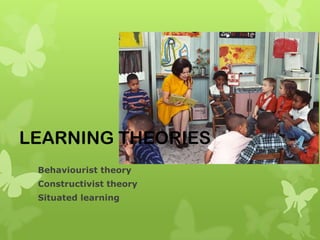
Learning theories
- 1. LEARNING THEORIES Behaviourist theory Constructivist theory Situated learning
- 2. Behaviourist theory Its main influences were Ivan Pavlov, who investigated classical conditioning John B. Watson (1878-1958) who rejected introspective methods and sought to restrict psychology to experimental laboratory methods. B.F. Skinner, sought to give ethical grounding to behaviorism, relating it to pragmatism.
- 3. Behaviourist theory Behaviourist Theory maintains a focus on the change in observable behaviours as the manifestations of learning. Thus the theory states that is learning is the acquisition of new behaviour through conditioning
- 4. Behaviourist theory The means of conditioning is achieved in two ways namely, classical and operant. Operant conditioning is where there is reinforcement of a behaviour by a reward or punishment. Reinforcement is any means of increasing the likelihood that an event will be repeated.
- 5. Behaviourist theory Classical conditioning is where the behaviour becomes a reflex response to stimulus. For example Dogs who were fed continuously by persons in lab coats reacted as if food was on its way whenever they saw a lab coat
- 6. Characteristics Behaviourist believes: Learning is manifested by a change in behaviour Environment shapes behaviour ( nurture) Contiguity and reinforcement are integral to the learning process. Contiguity describes how close in time two events must be for a bond to be formed and Basic laws of learning are the same for all animals whether dogs or humans.
- 7. Implications: Learning environment Behaviourist view learning as a change in behaviour, therefore educators arrange the environment to get desired responses through: Behavioural objectives Competency based education Skill development and training
- 8. Constructivist theory Constructivism is a synthesis of multiple theories diffused into one form. It is the assimilation of both behaviorialist and cognitive ideals. The “constructivist stance maintains that learning is a process of constructing meaning; it is how people make sense of their experience”
- 9. Characteristics of the Constructivist theory Constructivist believe that: Peoples construct their own understanding of the world through experiencing things and reflecting on these experiences. When learners encounter something new, they reconcile it with previous knowledge and experiences. In the end they may change what they believe , or they may discard the new information as irrelevant.
- 10. Implications: Learning environment The teacher acts as a facilitator and guide in helping the students to become active participants in their learning. Thus enabling them to make the connection between prior knowledge and new knowledge. The teacher helps the student to construct knowledge rather than reproduce a series of facts.
- 11. Implications: Learning environment The teacher provide tools such as problem solving and inquiry based learning activities so that student can formulate and test their ideas, and draw their own conclusions.
- 12. Situated Learning Situated Learning Theory, created by Jean Lave and Etienne Wenger as a model of learning in a community of practice, advances that learning is involuntary and situated within authentic activity, context, and culture. Simply put, situated learning is learning that takes place in the same context in which it is applied.
- 13. Situated Learning Situated learning is related to Vygotsky’s notion of learning through social development Regular classroom learning activities involve: 1) Abstract knowledge which is in and out of context,
- 14. Characteristics Lave argues that learning is situated; that is, It occurs normally (unintentional rather than deliberate) It is embedded within activity It is embedded within context and It is embedded within culture. Lave and Wenger (1991) call this unintentional learning a process of “legitimate peripheral participation” or LPP
- 15. Implications Knowledge needs to be presented in authentic contexts — settings and situations that would normally involve that knowledge. Social interaction and collaboration are essential components of situated learning — learners become involved in a “community of practice” which embodies certain beliefs and behaviours to be acquired.
- 16. Implications As the beginner or novice moves from the periphery of a community to its center, he or she becomes more active and engaged within the culture and eventually assumes the role of an expert.
- 17. Learning activity: Constructivist theory Students will go on a nature walk and will be encourage to choose a hibiscus flower. They will be guided by the teacher in taking apart the flower then they will examine and name the different parts.